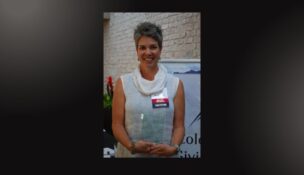This MSU Teacher Is a Conduit to a Career in Sports for Students
In the growing sports business arena, Colleen Colles teaches students rules of the game
Stewart Schley //October 8, 2019//


This MSU Teacher Is a Conduit to a Career in Sports for Students
In the growing sports business arena, Colleen Colles teaches students rules of the game
Stewart Schley //October 8, 2019//

For every baller who makes it to the NBA, there are thousands of wanna-be superstars sinking game-winning threes on cement driveways and scarred asphalt surfaces. Same for every sport: The Little League outfielder dreams of robbing a would-be homer to clinch the World Series. The soccer starlet conjures the perfect corner kick as it weaves through defenders and finds the netting for a World Cup victory.
The buzzkill here (sorry) is that most kids won’t ever see that day. But that reality doesn’t mean young sports enthusiasts can’t make it to the big leagues.
Colleen Colles is here to see to that.
Colles isn’t a coach (although she used to be; collegiate women’s volleyball) or a team owner. But she is, for hundreds of young people, a conduit to a career in sports. As professor of Sport Management at Metropolitan State University of Denver, Colles orchestrates the only accredited Sports Management academic program in Colorado. Every fall, 50 or more students enlist or return to pursue a 60-credit regimen of study touching on almost every aspect of the sports business: from legal considerations to digital media mastery to financial management to environmental impact. A new Sports Management minor program should increase overall enrollment beyond that number.
Colles’ students have wide-ranging aspirations. Some want to unleash their inner Jerry Maguire, representing athletes in contract negotiations. Others are into sports marketing: figuring out how to dance around the challenge of filling seats when teams are on a losing streak. Graduates have landed jobs with the likes of Kroenke Sports, Mile High Collegiate Baseball, USA Track & Field and the Colorado Rockies. Some go on to collect advanced degrees in business or law.
In total, about 210 students have attained Bachelor of Arts degrees in sports management since the program’s 2017 accreditation. Other universities and colleges in Colorado offer classes in sports management, but MSU Denver is the only Colorado institution – and one of just 32 nationally – to earn a seal of approval from the Commission on Sport Management Accreditation, the national academic organization that oversees standards for sports management degrees. Colles says achieving accreditation was painful – it meant rethinking courses, adding staff and grinding through a four-year odyssey – but is paying off in terms of reputation and allure for serious-minded students.
Colles is an enthusiastic booster for the sports-as-career ideal. She admits to having stalked the MSU Denver job from afar, determined to move to Colorado after working as department chair for the Sport Management program at Nichols College in Massachusetts.
A career in sports management isn’t for everybody, Colles cautions. She points out working in sports is still … work. It can be a demanding profession given the frenetic pace of change, and there are big challenges lately around the intersection of media presentation and live-gate attendance. The at-home experience has gotten so appealing that it’s harder than ever for teams to convince fans to come out for the game – even for the mighty NFL. There are also tricky legal issues around liability (think baseball and its netting controversy), economics (players continue to get rich while leagues worry about revenues) and competition (most of the prominent leagues now aspire to provide year-round content). A common thread is the ephemeral quality of live spectator sports: “It has absolutely no shelf life,” Colles says. “It happens and it’s consumed at the same time.”
But the swirl of change is also what makes the field alluring. For lecture content, Colles relies not on quick-to-age textbooks but headlines from in-the-know trade publications like Sports Business Journal. When we spoke in July, the U.S. Women’s Soccer team was on the cusp of a repeat World Cup championship, an accomplishment that occurred against a backdrop of questions about equal pay for female athletes. Her summer schedule also included keeping in touch with graduates who are working for employers including Special Olympics, the Denver Nuggets and others.
Jobs like that are the goal, as Colles and her team aim to help students make the leap from classroom to cubicle. A big part of the program, beyond the Xs and Os of sports economics and legal affairs, is cultivating basic professionalism. Colles wants her students to know how to wear the right clothes for an interview, to shake hands convincingly, to sustain eye contact. Imparting these skills is a natural evolution from Colles’ past profession in that the techniques needed to win can be taught and learned. She’s no longer rallying for a comeback from courtside, but in a sense, Colles is still every bit the coach, drawing up a new set of plays to help students compete in the real world.

























